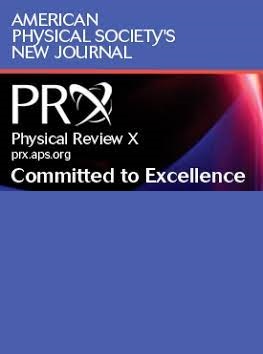Entangled Dual-Comb Spectroscopy
IF 15.7
1区 物理与天体物理
Q1 PHYSICS, MULTIDISCIPLINARY
引用次数: 0
Abstract
Optical frequency combs have emerged as a cornerstone for a wide range of areas, including spectroscopy, ranging, optical clocks, time and frequency transfer, waveform synthesis, and communications. However, quantum-mechanical fluctuations of the optical carrier impose fundamental performance limits on the precision of classical optical frequency combs, particularly in their use for interferometry and spectroscopy. Entanglement, as a quintessential quantum resource, allows for surpassing the fundamental limits of classical systems. Here, we introduce entanglement into the realm of optical frequency combs, formulating entangled dual-comb spectroscopy (EDCS) that surmounts the fundamental limits of classical DCS. EDCS capitalizes on tailored entangled structures across the frequency comb, enabling simultaneous detection of all comb lines below the standard quantum limit of classical DCS. Applying EDCS in gas detection, we achieve a 2.6-dB enhancement in signal-to-noise ratio and a 1.7-fold reduction in integration time over classical DCS, rendering EDCS particularly suited for dynamic chemical and biological sensing, where fast, precise measurements subject to power constraints are required. EDCS opens a new avenue for exploiting quantum frequency combs, underscoring their prospects in a plethora of applications in precision metrology, spectroscopy, and timekeeping.纠缠双梳光谱
光学频率梳已成为广泛领域的基石,包括光谱学,测距,光学时钟,时间和频率传输,波形合成和通信。然而,光学载流子的量子力学波动对经典光学频率梳的精度施加了基本的性能限制,特别是在干涉测量和光谱学中。纠缠作为一种典型的量子资源,允许超越经典系统的基本限制。在这里,我们将纠缠引入光学频率梳领域,制定了纠缠双梳光谱(EDCS),超越了经典DCS的基本限制。EDCS利用频率梳上定制的纠缠结构,能够同时检测低于经典DCS标准量子限制的所有梳线。将EDCS应用于气体检测,我们实现了2.6 db的信噪比增强,并将集成时间减少了1.7倍,使EDCS特别适合动态化学和生物传感,这些传感需要在功率限制下进行快速,精确的测量。EDCS为开发量子频率梳开辟了一条新的途径,强调了它们在精密计量、光谱学和计时领域的大量应用前景。
本文章由计算机程序翻译,如有差异,请以英文原文为准。
求助全文
约1分钟内获得全文
求助全文
来源期刊

Physical Review X
PHYSICS, MULTIDISCIPLINARY-
CiteScore
24.60
自引率
1.60%
发文量
197
审稿时长
3 months
期刊介绍:
Physical Review X (PRX) stands as an exclusively online, fully open-access journal, emphasizing innovation, quality, and enduring impact in the scientific content it disseminates. Devoted to showcasing a curated selection of papers from pure, applied, and interdisciplinary physics, PRX aims to feature work with the potential to shape current and future research while leaving a lasting and profound impact in their respective fields. Encompassing the entire spectrum of physics subject areas, PRX places a special focus on groundbreaking interdisciplinary research with broad-reaching influence.
 求助内容:
求助内容: 应助结果提醒方式:
应助结果提醒方式:


